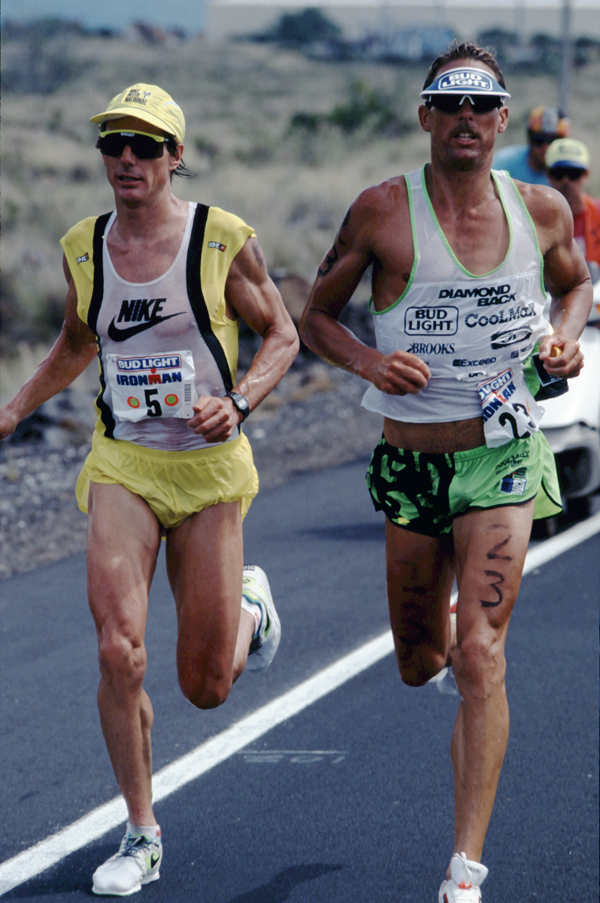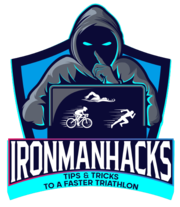I know it sounds odd, but alcohol has always had somewhat of a connection to cycling and even triathlon.
As an early Ironman sponsor, Bud Light (is there even alcohol in that?) appeared at Kona.
Just look at this famous image of Dave Scott and Mark Allen fighting it out and you’ll see the the logos on their bibs and on Dave’s sweet visor and tank top.

And Erdinger’s Alkoholfrei is another example, and in fact it’s been a sponsor at Challenge Roth.
And more than a century ago, competitive cyclists started using alcohol and even ether to dull the pain and increase performance.
This sounds pretty mild considering they were also taking other things like cocaine, amphetamine, strychnine, and nitroglycerine. (reference)

And you have probably heard of the Beer Mile, which has runners drink a beer every 400 m for a mile. Surprisingly, that has attracted some pretty good athletes, with one guy doing it in 4:33.6.
And in fact I’ve participated in something similar. A few years ago, I did six 500 m laps with a beer at each lap. This was the only time I ever beat a pro triathlete.
There were only about a dozen of us, and I got first place, but only because I think I had more college fraternity beer chugging experience than anybody else. Yay.
But drinking and competing is just silly. More practically, many of us ponder whether or not we can or should drink while training.
I seriously reduced my alcohol consumption in the past 5-6 years since beginning regular training. I never thought this would happen but I’m glad it has.
It just doesn’t make sense to drink much when you have to wake up early and then pack training-work-family back-to-back six to even days a week.
On pre-dawn training rides I’ve seen revelers, drunk and lost, stumbling around the streets like mindless zombies and it always makes me thankful I’m not like that anymore.
The contrast between what I’m doing and what they’re doing (and I used to do) is so stark and poignant it makes me never want to stay out late again or have more than two beers at a time.
Incidentally, just a few weekends ago, on a long ride some cycling friends and I stopped to help a woman who had crashed her car.

Credit: Gerald Manceau
When we got her out of the car we realized she was totally wasted and had vomit all over herself. We unhooked her car battery so she couldn’t drive and called the police.
But still, every now and then I’ll have one, and that’s ok. In fact, we’ve all seen the studies saying small amounts of alcohol can reduce the risk of heart disease.
Much of the credit goes to red wine for that. I’m not sure I totally buy that argument – more on that later.
And as Mollie McGlocklin, from Sleep is a Skill mentioned in her last newsletter, many people are now realizing that alcohol is detrimental to good sleep.
However, I used to think it was a good tool to get to sleep (pass out?) but she’s tracked clients who drink before sleep and their heart rates tend to spike much more than those who don’t drink before bed.
Mollie refers to the term (and eponymous book) “Sober Curious” which refers to people exploring the novel concept of alcohol abstinence. (Imagine that!)
One Year No Beer (OYNB) is another movement that has come up in recent years, and I’ve read the OYNB book which makes a compelling case.
Triathlete Amy Says So has a good solution: Try non alcoholic beer. She claims that she indeed enjoys the taste of beer, alcohol or not, but that her teenage kids don’t think this is possible.
She mentions this in her review of Athletic Brewing’s non alcoholic beer.
But years ago, all non-alcoholic beers I tried were horrible. They tasted like apple juice. But those I’ve tried in recent years were excellent.
Though ordinary lagers are pretty dull and bland to me, Carlsberg and Heineken have done great jobs at producing palatable (and potable) non-alcoholic lagers which I’m happy to drink.
Erdinger’s Alkoholfrei, mentioned earlier, is better in my opinion as it’s more of a wheat beer. Plus, they market it as isotonic, even, but I wouldn’t exactly put this in my bike’s hydration tank. Or maybe I would…?
And very recently, Dr. Alex Harrison, whom we’ve talked to numerous times about nutrition wrote an article with Michelle Howe, R.D. for Triathlete.com.
It’s behind a paywall, but I quote, “Yes, even light alcohol consumption has health risks.”
“More clearly: Alcohol is not good for you, on net. It’s probably not even close, even in the lightest drinking.”
Which makes me think that the aforementioned red wine-being-beneficial argument, while probably true in some cases, is a nice bit of confirmation bias or cherry-picked research. Dr. Harrison’s article explores such biases.
Harrison and Howe write this with what I would call a very objective and balanced approach, considering said biases of researchers, the alcohol industry, and doctors.
So in short, triathlon has done a lot of good for me, and much of that is in the area of alcohol reduction.
My college drinking days a long behind me, and many of my social events are dry.
But that’s not to say I won’t have a beer once every week or two, but rarely more than that, and that’s fine.
Cheers. 🍻


Leave a Reply
You must be logged in to post a comment.